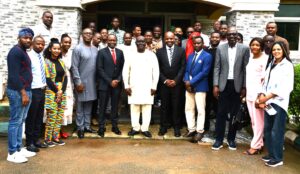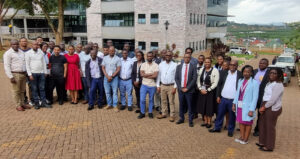In a critical step toward improving the quality of healthcare diagnostics across Africa, the African Society for Laboratory Medicine (ASLM), in collaboration with Biologic Calibration Solutions, has launched an intensive two-week training program for laboratory professionals. The training, focused on the calibration and maintenance of laboratory testing equipment, is being held concurrently from September 2-13, 2024, at the Medical Laboratory Science Council of Nigeria (MLSCN) in Abuja, Nigeria and the Central Public Health Laboratories (CPHL) in Kampala, Uganda.
The training program brings together 60 participants from various countries, including the Burkina Faso, Cameroon, Democratic Republic of Congo, Ethiopia, Ghana, Kenya, Malawi, Mozambique, Nigeria, Rwanda, Senegal, Tanzania, Uganda, Zambia and Zimbabwe and equipping them with the necessary skills and knowledge to ensure that laboratory equipment across the region meets international standards for accuracy and reliability. The training focuses on both developing technical skills and includes the provision of calibration instruments and ongoing mentorship. This comprehensive approach ensures that participants can maintain their equipment and pass on their expertise, further strengthening the region’s capacity.
As part of a broader initiative led by ASLM, and supported by the U.S. Centers for Disease Control and Prevention (CDC) through the President’s Emergency Plan for AIDS Relief (PEPFAR), this training aims to address the critical shortfall in regional calibration and maintenance capacity. By building local expertise, the program seeks to create a sustainable system where laboratories can consistently produce high-quality diagnostic results, essential for informed healthcare decision-making, timely public health responses, and enhanced disease surveillance.
In his opening remarks at the Abuja training, Prof. Tosan Erhabor, CEO and Registrar of MLSCN, emphasized the crucial role that well-calibrated equipment plays in delivering quality diagnostic services. He noted that accurate, reliable, and timely results are fundamental to effective patient care and healthcare policy.
 For years, the need for such an initiative has been clear, as many African laboratories have grappled with the high costs of calibration equipment and the scarcity of regional calibration centers. This initiative addresses longstanding challenges in African laboratories, such as inadequate infrastructure, a shortage of skilled personnel, and limited access to proper calibration facilities, all of which have compromised the accuracy and reliability of diagnostic tools. This situation has often left laboratories reliant on external support, leading to delays and inconsistencies in diagnostic outcomes and impacted the effectiveness of disease diagnosis, treatment, and public health interventions across the continent. ASLM’s initiative is designed to break this cycle by empowering local professionals with the tools and training necessary to maintain and calibrate equipment independently.
For years, the need for such an initiative has been clear, as many African laboratories have grappled with the high costs of calibration equipment and the scarcity of regional calibration centers. This initiative addresses longstanding challenges in African laboratories, such as inadequate infrastructure, a shortage of skilled personnel, and limited access to proper calibration facilities, all of which have compromised the accuracy and reliability of diagnostic tools. This situation has often left laboratories reliant on external support, leading to delays and inconsistencies in diagnostic outcomes and impacted the effectiveness of disease diagnosis, treatment, and public health interventions across the continent. ASLM’s initiative is designed to break this cycle by empowering local professionals with the tools and training necessary to maintain and calibrate equipment independently.
This initiative marks a significant milestone in the effort to enhance Africa’s healthcare systems, particularly in medical laboratory services. As these newly trained professionals return to their home countries, they will play a vital role in ensuring that diagnostic services are accurate, reliable, and meet international standards. This, in turn, will improve the overall quality of healthcare across the continent, paving the way for more effective public health strategies and better patient outcomes.
ASLM’s efforts, backed by CDC-PEPFAR, represent a major advancement in the journey toward self-sufficiency in healthcare diagnostics in Africa, laying the groundwork for a future where high-quality diagnostic services are accessible across the continent.



